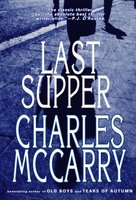
From a Forbes.com review of John Lawton's A Little White Death:
"John Lawton joins the ranks of literary-minded thriller writers such as Alan Furst and Charles McCarry."
From an Entertainment Weekly article on the television show "24":
"24 is moving into areas of political suspense that, until now, were mostly the province of novels, such as those by Charles McCarry, Ross Thomas, and — on the other side of the pond — John le Carre."
From a March 17 New York Sun piece on the top 5 Washington, DC political satires:
"#3: 'Lucky Bastard,' Charles McCarry. This former CIA agent crafted a darkly satiric tale of Jack Adams, a charming liar and compulsive womanizer with a mastery of politics. This is the Clinton years through the eyes of a paranoid conspiracy theorist with a viciously sharp sense of humor."
And finally, Otto Penzler includes McCarry in a list of espionage writers who engaged in a little spying themselves in his February 22nd column in the New York Sun:
"Among the most distinguished authors of espionage fiction of the 20th century are W. Somerset Maugham, who wrote the first realistic collection of short stories about a spy, "Ashenden" (1928); Erskine Childers, who wrote the first pure spy novel of the 20th century, "The Riddle of the Sands" (1903); John le Carre, whose "The Spy Who Came in from the Cold" (1963) and George Smiley novels have been well-filmed and never out of print; Graham Greene, who wrote what he called "entertainments" of such high quality that they are regarded as serious literature, even by snobbish critics, notably such classics as "Orient Express" (1933), "This Gun for Hire" (1936), "The Confidential Agent" (1939), "The Ministry of Fear" (1943), and "The Third Man" (1950); and Charles McCarry, America's greatest espionage writer, the author of such masterpieces as "The Tears of Autumn" (1975) and "The Secret Lovers" (1977).

But did you know that every one of these authors was also a spy? Maugham worked in Russia and Switzerland between the world wars; Childers was a British hero in the Boer War and World War I who later moved to Ireland and was shot as a traitor by an Irish Free State firing squad; Mr. le Carre had a desk job with MI5, at which he met fellow spy novelist John Bingham; Greene, employed by MI6, became friends with the British traitor and Soviet spy Kim Philby, and is reputed to have aided the Soviets with some spying himself, as well as protecting Philby; and Mr. McCarry was a field worker for the CIA for more than a decade."
--John Mark

No comments:
Post a Comment